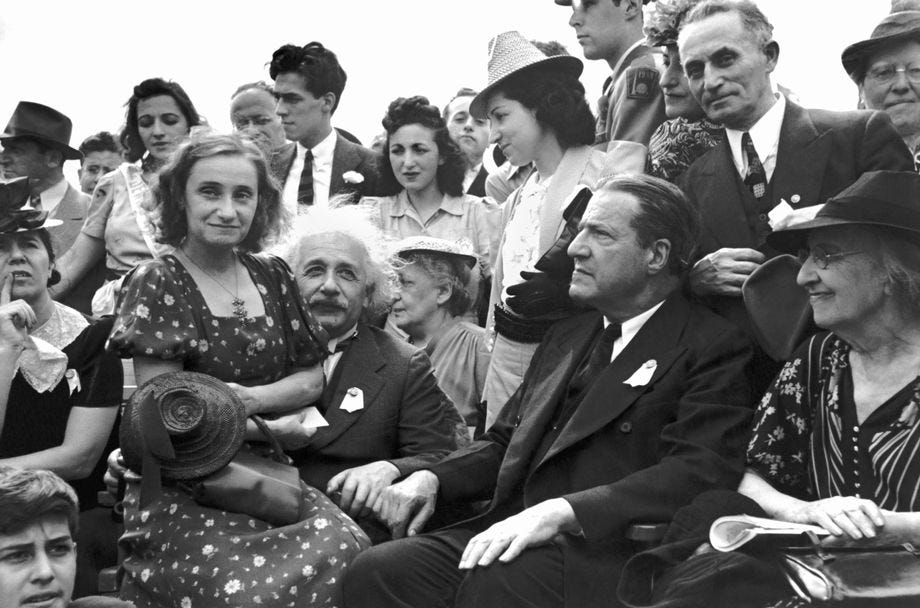Tricks to Slow Time Down
How to live more than mere mortals; and a disagreement with Einstein 🕰

I wrote this entire post about the benefits of traveling for fun, and it took only two days of actual travel to realize I had completely missed the most interesting effect of being a tourist: it slows time down. By a lot.
On a normal day in my normal life, I’m mostly at home, or perhaps in a coffee shop. I work, I cook food, I take at least one walk, often to the grocery store. I read, play games, write blog posts, and browse Twitter. I go to bed and repeat, with slight variations, on the next day.
On the first two days of my trip, I walked around an unfamiliar city for at least an hour, then I ordered coffee using a language (Spanish) I speak with about 25% proficiency, then I visited a large museum that has collections of artifacts from at least a dozen different civilizations, then I walked around another neighborhood of the unfamiliar city, then had lunch in a restaurant that is also a bookstore, then I ubered to the airbnb (I kinda hate that these are now words), then I played the piano (there was, somehow, a grand piano in the airbnb), then had dinner in a gentrified fancy hot dog restaurant, then I went to sleep in an unfamiliar bed, then I walked across more new neighborhoods to reach the historical center of the city, then I visited a church, and then the ruins of an Aztec temple, after which I walked into an extremely chaotic neighborhood full of small stores and thousands of shoppers, which led to a large covered market that was even more chaotic and had even more small stores and shoppers, which I tried to escape by taking the metro, but couldn’t because that particular metro station was closed, so I walked to another metro station, which was also closed, so I walked some more until I got to a functioning metro station, at which point I took the metro to yet another neighborhood, where I tried to find a coffee shop to sit down and go to the baños (the bathroom), failed once (there were no baños), then succeeded, and then I spent a couple hours resting my legs while drinking cold brew tónico, and then I walked to a quasi-secret restaurant that’s not even on Google Maps, then waited in line there, then entered and had a drink in the bar, then finally got to the restaurant’s main floor, then had delicious Thai-Mexican food, and then ubered back to the apartment.

You are forgiven if you didn’t read that wall of text. The point is that it is a wall of text, unlike the paragraph before it. Our days in Mexico City were filled with so much fun, novel, interesting stuff! I’m perfectly happy with my normal daily life, but it’s necessarily far more repetitive and boring than a vacation spent touring a new city.
And the difference in paragraph lengths reflects a real difference in my subjective perception of time. Somewhere around the end of the second day, perhaps at the quasi-secret Thai-Mexican restaurant, I tried thinking about all the dinners I had had so far in the trip. I remembered the gentrified fancy hot dog place. But then my memory drew a blank — until I realized that I had been in Mexico for less than 48 hours. It felt like at least a week.
Today, a few days after being back from nine days abroad, it feels as if early February 2023 — a period of my life that did contain its share of interesting events, like singing and public speaking at a choir concert — was at least several months ago.
It feels like I have lived more than usual. It feels like time has slowed down.
So going on a tourist trip and cramming your days with sightseeing and new neighborhoods and restaurants is a trick to slow subjective time down. What else is like this?
The intuitive answer is something very opposite to traveling: doing boring, tedious, or unpleasant stuff. If, like most people, you have a repetitive job, you probably feel that your work shifts are long. If you wait at the motor vehicle office to get your driver’s license renewed (a situation I unfortunately found myself in yesterday), you’ll probably feel that the wait is long.
Conversely, fun stuff is often described as going too fast. Thus Einstein’s famous quote (which is apparently, and surprisingly, not apocryphal, though the evidence is indirect): “When you sit with a nice girl for two hours you think it’s only a minute, but when you sit on a hot stove for a minute you think it’s two hours. That’s relativity.”
But my vacation, which was pleasant, didn’t feel like it was going too fast. Almost the contrary; it felt so long (while pleasant!) that I almost thought I was somehow cheating — living longer than mortals should. So what’s going on?
Fun is not, on its own, a strong accelerator of subjective time.
If it feels like it, that’s because of a simple illusion: we would generally like to have more pleasant moments than unpleasant ones, so pleasant moments feel shorter than we would prefer, while unpleasant moments feel unnecessarily long. This is further confounded by occasional states of flow — the emotion of being fully immersed into an activity. Flow makes you stop thinking about the passage of time, which we equate to time flying fast. But that is another illusion: when you’re out of the flow state and can think about the time that elapsed, it’ll feel either short or long depending on whatever you were actually doing.
And so the main determinant of subjective time is not fun, or lack thereof. Rather, it is something like novel or attention-grabbing experiences. My trip to Mexico was packed with tons of new things, new foods, new places, and generally situations I wanted to pay attention to — so it subjectively feels extraordinarily long.
There are many kinds of novel and attention-grabbing experiences — and, accordingly, many ways to slow time down. According to this very relevant video, studies have shown that people experience very slow subjective time when they’re forced to confront something they’re afraid of, like spiders. Time also slows down considerably when people do intense activities like rope jumping. I can also attest that going through uncommon but highly emotional life events, such as a romantic breakup, tends to slow time down quite a lot: the whole period around the breakup seems to expand in the narrative of our life.
Biologically, our perception of time seems to be directly related to how much work our brain is performing at any given moment, which is directly related to awareness, which is directly related to things like novelty and whatever feels particularly important.
Time passes slowly for young kids, because so much is new to them. It passes fast for lonely old people who don’t see anyone and don’t try new activities. It passes slowly at work, because you’re actually working and paying attention to what you’re doing. It passes fast when you’re in the unconscious limbo of sleep and are utterly unaware of anything happening outside your dreams.
Einstein’s joke on relativity, then, is wrong, or at least incomplete. (Sorry, Mr. Einstein.) The part about the hot stove is fine: discomfort and pain trigger our awareness, and therefore feel long. Such situations are unpleasant and novel.
The part about the nice girl, on the other hand… I don’t know, I don’t buy it. Meeting people, especially fun and attractive people that I want to spend a lot of time with, seems like something that expands time rather than constricting it. Perhaps the problem is that the quote, as commonly phrased, just says “sitting with” the girl. In my mind’s eye, this is not a very interesting scene, quite the opposite! It seems like nothing is happening; I just imagine Albert Einstein being relaxed in a living room while the pretty girl is bored.

Plausibly, this is not what Einstein had in mind (assuming he even actually made that joke in those words, or whatever equivalent it would be in German). But the joke would sound less true if we were contrasting the hot stove with a highly stimulating, engrossing conversation with the nice girl.
In other words, because fun is independent from novelty or stimulation, there are four big categories, only the first two of which are present in Einstein’s joke:
Unpleasant and novel/stimulating: sitting on a hot stove, seeing a spider, breaking up with a romantic partner, losing a loved one
Pleasant and boring/relaxing: sitting doing nothing with a nice girl or guy, watching a movie you’ve seen many times, walking around your familiar neighborhood
Unpleasant and boring/relaxing: waiting in a government office, driving in traffic, eating bland food, being awake in bed while failing to fall asleep
Pleasant and novel/stimulating: visiting a new city, meeting cool people, watching a new and intellectually satisfying movie, falling in love.
It seems obvious that we want to be in pleasant situations (2 & 4) most of the time. I think it’s also true that we should strive, to an extent, to favor 4 over 2 (and perhaps 1 over 3).
Of course, I’m not saying that it’s desirable to fill a life with as much novelty as my nine days in Mexico City contained. I wouldn’t want that myself. I’m happy to be back home in a state where I don’t need to pay close attention to everything, where I can coast on prior decisions while building up energy to be aware and curious again.
And of course, everyone is different. I know I’m slightly unusual in that I seek psychological richness more than comfort or purpose; if you’re not like that, then maybe you should ignore my advice.
But living more, and cheating death, while making sure to keep it fun (so, no hot stoves or spiders), seems a worthwhile goal. Seek out interesting situations. Meet cool new people. Travel. Learn new languages. Fall in love. Take up a new hobby. In general, do things instead of watching. Be dazzlingly alive.
Time will never stop for you — but you do have way more power over it than it may seem.









And those two years of covid and lockdown produced a hole/pause in time that I still can’t quite get my head around!